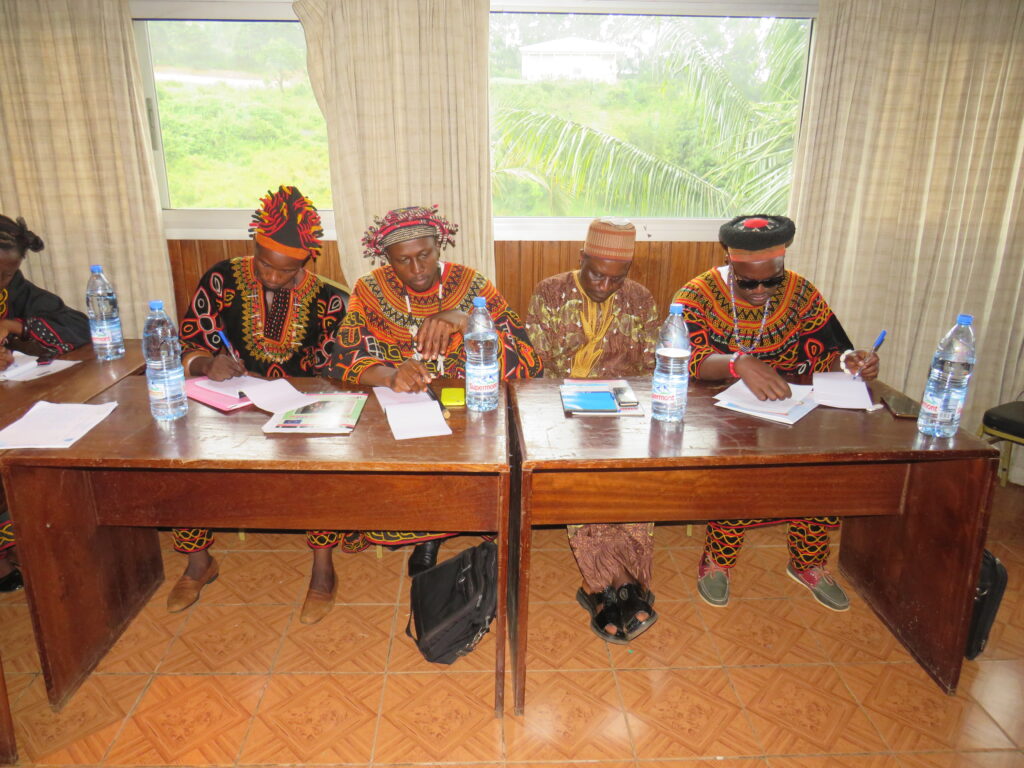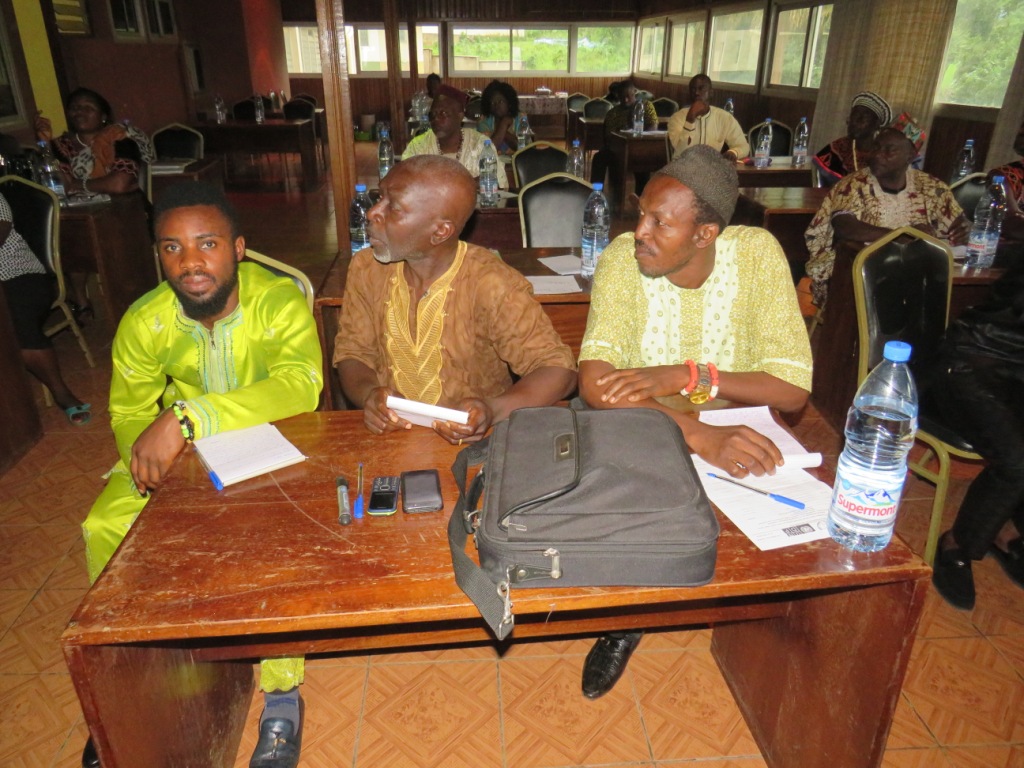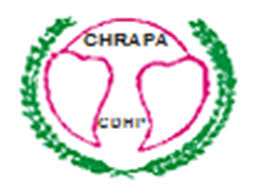Press café theme: what should be the content of the special status recommended for the North West and South West Regions of Cameroon?
The press café started at 2:20 with a word from Madam Grace Ngwafor who welcomed all and it was followed by the rundown of the objectives and expectations of the press café. A word of prayers was offered. The moderator then called on the participants to contribute useful and give worthy proposals that will be useful for the wellbeing of the Anglophones in line with the special status. A background knowledge on the previous press café was given and admitted that participants were different from those of the previous edition. The theme and expectations were introduce. The moderator said that the Grand National dialogue ended with recommendations and it was time to map the way forward for the implementation. He added that in line with that, the press café expects opinion leaders here sited to make contributions bearing in mind that none is useless..

The moderator then officially threw the theme to the participants. To one of the participants, the issue of the special status meant acceptance and endorsement of the special status granted. She added that in her opinion, a much better way of solving this crisis is not a special status but going back to the 1961 status. The moderator stepped in at this point to propose that it was a good idea but not relevant to the press café. According to the moderator, all recommendations should be in line with the way forward should the status finally be granted. It was recommended that the constitution be used as a guiding criteria for the discussion. This led to the reading of (sec 61-63). These sections give the modalities on the provision of special status and on the revision of the constitution. It was proposed that debating on whether or not the special status should be granted was irrelevant because the constitution was clear on such rights.
Another participant drawing inspirations from international law, presented some examples of the forms of state that Cameroon could copy; Federated state as in Quebec, Simi federated state as in Catalina, etc. He went further to advance that the granting of the special status to the Anglophone regions, is a recognition of the minority as a national minority. This means that some of the requests like self-determination, secession etc. could be emphasized on these grounds. If this happens, Anglophones could now have the right to determine their social, economic and political status. Adding to his suggestions, he Compared Cameroon to other states, who with such status had the right to a self-determination because they have been recognized as a separate people in line with the United Nations’ provisions. This Self-determination would create commissions on each unit of the state like the army but still be answerable and controlled by the central government. It was added that obstacles to the granting of the self-determination or an autonomous state or federation seem to be the fear of its cost and transparency.

A participant asked to know whether it is possible to be talking of federation in a special status. He gave reasons that federation comes with bigger rights and special status -momentary rights that can be taken away from you any time. Reacting to this, the youth leader from the Mbororo community said that even if the special status granted was constitutional, it still has limitation. Another reaction was that if arguments emanate from a constitutional provision, we could have a better way forward. A participant said if truth be told, the faith of Cameroonians is in the hands of a man that is not taking the views of the people into consideration. He called it a constitutional hold up where much power has been amassed by a single person to the detriment of the people. He therefore proposed that as of the 3 examples earlier proposed as inspired from other countries, we could imitate one and why not all 3. He particularly preferred the Quebec example. Reacting to that, the moderator said we should be explicit on picking examples because each country has different approaches to governance with different contents. Mr. Ignatius stepped in at this point and elaborately gave the advantage of tackling our proposals from the constitution so as to be within the law. According to the moderator, why not use the parliament and constitution as a solution wing instead of the Grand National dialogue. Another participant did not endorse this argument because the constitution in section 63 give the president the right to change certain aspects concerning the form of state. He further explained that the major national dialogue was in line with article 63 and thus if it did not solve the crisis, it could be used to bring solutions to other aspects of the problems of the people. Another proposal stated that our contributions should not be limited to the constitutional provisions. This was objected.
The moderator stepped in on the objective which is the content of the special status. He further explained that the UNDP is using such round table conferences to seek a way forward to this problem. It is a diplomatic view to cause civil society observers to participate in decision making for our people in line with the special status. This reminder was followed by a guideline line from the moderator who advanced the importance of understanding functionality of certain foreign models like the Canadian model which consist of 13 provinces deriving their rights from the constitution, the United Kingdom made up of developed regions who are independent and are affiliated to FIFA unlike Spain that does not, and the US who is constitutionally federated but still has some limitations certain aspects. He concluded that based on these understanding, we should not be prompted to borrow from foreign models but come up with a local strategy.
Reacting to that, other participants saw nothing wrong in borrowing and drew inspiration from the UK model that grants equal status and equal participation. In reaction to that, it was proposed that African countries also have good models like the Ghana – Kenya model where their governors are elected and run regional councils where the judicial police is answerable to them. Adding to that, it was requested that our proposed model be satisfactory to all parties especially the extremists. This should include a clause on controlling and monitoring the activities of the elected governors for accountability. E.g. elections should be the guiding and participatory mechanism of controlling the governors. This was objected that it will be like state of protectionism.
It was proposed that we should shift from a bijural to a bipolar system and accompanied by the self-autonomy in governance.
Another proposals is the fact that we are a minority dealing with a majority and thus deciding on our future could be misrepresented by the majority. After objecting on that fact, it proposed that the discussions should include the interest of other regions because as noted, they either suffer the effect or are part of the cause of our problems.
An expression of hopelessness by a participant in line with delay in implementing the recommendations of the Grand National dialogue was objected that each decision is followed by a procedure. The following proposals were made at the end of the press café;
- The special status should touch each unit of the Anglophone context and decided upon as per their design e.g. football, parliament etc.
- Conditions for reconstruction should include concrete actions to involve all those involved in the crisis to participate in the solution and development of the regions.
- Tata suggested that the special status should be accompanied with a reconciliatory mechanisms for peace to return.
- The criminal procedure in these regions should be amended to suit the Anglo-Saxon culture. This include the functions of the judicial police etc.
- Other aspects of the society like water, energy, education etc. should be determined in line with the aspirations of the people so far brought up.
- The rulers should be elected and we should be self-autonomous such that the Local government be answerable to the people.
- The term of office of the president be reduced to 5 years.
- The flag should come back to 2 stars.
- The presidency should rotate between Anglophones and Francophones.
- The national anthem should be re-formed.
It was agreed that other editions press café will be done every two weeks and suggestions from this one will continue to be welcomed.
The session ended with a word of thanks from the program coordinator who thanked all present on behalf of Mr. Chongsi, the Executive Director of CHRAPA. He further enlightened the participants that, recommendations will be forwarded to the UNDP which falls within the objectives of the press café and that they are the sponsors. He outlined other activities carried this context with the objective of getting a rights-based and participatory approach to decision making with regards to the current crisis. He also mentioned the objective of the UNDP project and the procedures followed after such an activity. He concluded that further recommendations will be welcomed by CHRAPA in the days ahead.
As a remark, it was proposed that next time invitations should be sent on time with the theme to encourage research and best participation. This ended the press café followed by photo shots.
In addition to the above proposals, Mr. Kwai Joshua of CHRAC proposed that there should be the restoration of the protection and defense of the core value of Anglophones including the following;
- The West Cameroon House Of Assembly
- Re-institution Of CAM BANK
- Security System Or Mobile Police
- Political System Of House Of Chiefs,
- A Traditional Cultural System (Choice Of Chiefs and Fons)
- The Reinforcement of the Community Development System.
Coordinators: Madam Grace Ngwafor/Mr. Tata Nelson.
Attendees: 23 members were in attendance made up of Members of the press, Teachers, Women and Youth Leaders, Church Leaders, Board Members and Members staff Of CHRAPA and the civil society members.
Moderator: Mr. Choves Loh from the Cameroon tribune.
